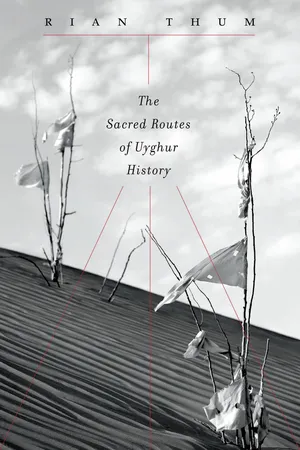The Sacred Routes of Uyghur History
About this book
For 250 years, the Turkic Muslims of Altishahr—the vast desert region to the northwest of Tibet—have led an uneasy existence under Chinese rule. Today they call themselves Uyghurs, and they have cultivated a sense of history and identity that challenges Beijing's official national narrative. Rian Thum argues that the roots of this history run deeper than recent conflicts, to a time when manuscripts and pilgrimage dominated understandings of the past. Beyond broadening our knowledge of tensions between the Uyghurs and the Chinese government, this meditation on the very concept of history probes the limits of human interaction with the past.
Uyghur historical practice emerged from the circulation of books and people during the Qing Dynasty, when crowds of pilgrims listened to history readings at the tombs of Islamic saints. Over time, amid long journeys and moving rituals, at oasis markets and desert shrines, ordinary readers adapted community-authored manuscripts to their own needs. In the process they created a window into a forgotten Islam, shaped by the veneration of local saints.
Partly insulated from the rest of the Islamic world, the Uyghurs constructed a local history that is at once unique and assimilates elements of Semitic, Iranic, Turkic, and Indic traditions—the cultural imports of Silk Road travelers. Through both ethnographic and historical analysis, The Sacred Routes of Uyghur History offers a new understanding of Uyghur historical practices, detailing the remarkable means by which this people reckons with its past and confronts its nationalist aspirations in the present day.
Frequently asked questions
- Essential is ideal for learners and professionals who enjoy exploring a wide range of subjects. Access the Essential Library with 800,000+ trusted titles and best-sellers across business, personal growth, and the humanities. Includes unlimited reading time and Standard Read Aloud voice.
- Complete: Perfect for advanced learners and researchers needing full, unrestricted access. Unlock 1.4M+ books across hundreds of subjects, including academic and specialized titles. The Complete Plan also includes advanced features like Premium Read Aloud and Research Assistant.
Please note we cannot support devices running on iOS 13 and Android 7 or earlier. Learn more about using the app.
Information
Table of contents
- Contents
- Note on Orthography
- Introduction
- Chapter 1. The Historical Canon
- Chapter 2. Manuscript Technology
- Chapter 3. The Shrine
- Chapter 4. History in Motion
- Chapter 5. Saints of the Nation
- Chapter 6. The State
- Conclusion
- Notes
- Acknowledgments
- Index
